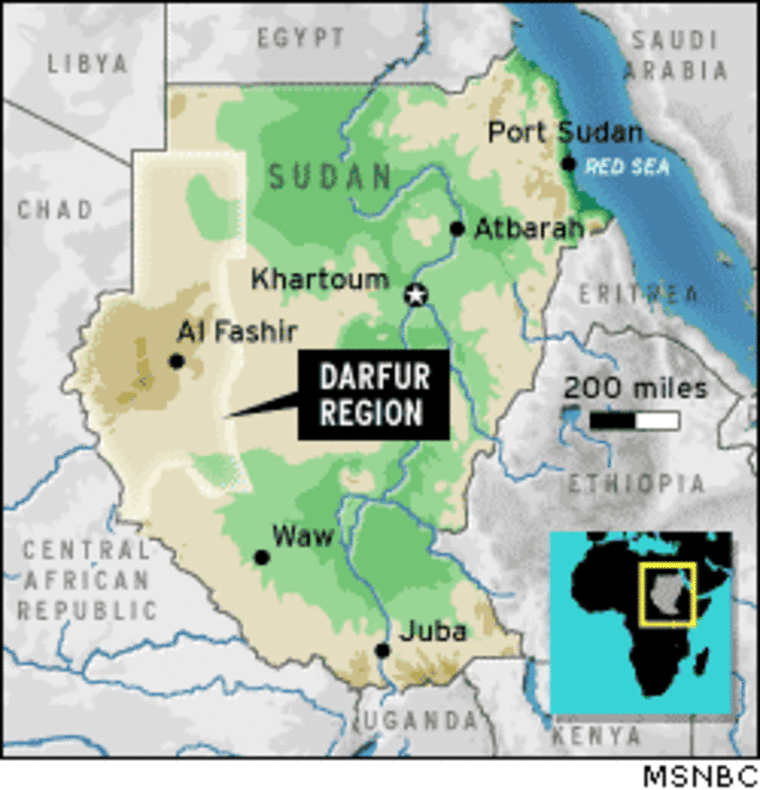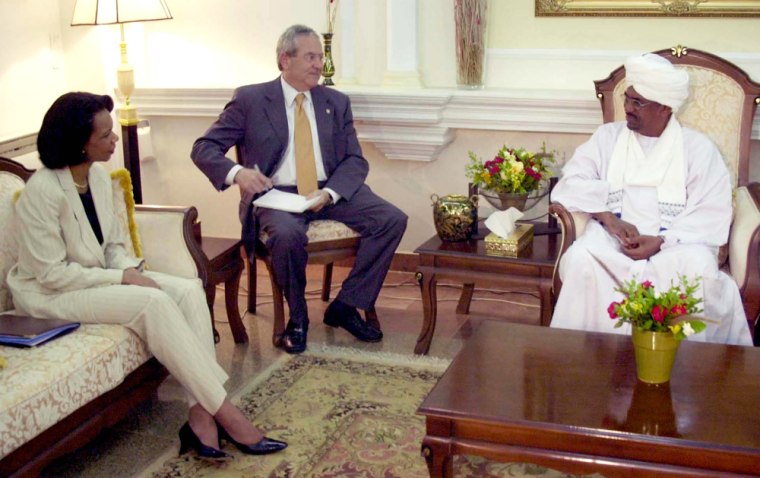The Sudanese government apologized to U.S. Secretary of State Condoleezza Rice after security forces manhandled U.S. officials and reporters traveling with her, including NBC News Andrea Mitchell, during a photo opportunity at the residence of Sudanese President Omar el-Bashir on Thursday.
When Mitchell asked, "Why should the U.S. believe the Sudanese government will stop the killing when the government is still supporting the militia?" Sudanese security guards grabbed her and muscled her out of the room while State Department officials shouted at them to leave her alone.
Rice was outraged by the bullying Sudanese security forces and demanded an apology, which she quickly received.
Mitchell describes the scuffle and how it is symbolic of how the Sudanese government treats not only guests, but its own citizens in what has been described as a policy of genocide supported by the Sudanese government in the Darfur region.
Why do you think the Sudanese security reacted the way they did to your line of questioning this morning?
They reacted to the fact that anyone was there to ask a question because the Sudanese government does not believe in freedom of the press.
In fact, when American officials argued with them that we should be allowed to have this photo opportunity and ask questions because there is freedom of the press, the Sudanese government responded that there is no freedom of the press here. And that says it all.
Condoleezza Rice was outraged by the behavior. Rice said that it was unacceptable and outrageous behavior by the Sudanese security forces. She demanded an immediate apology from Sudan’s government. She got one from the foreign minister when her plane touched down at the next location, within the hour.
But the bottom line was that some of her own officials in the delegation were roughed up when they tried to get into the meeting — including her translator — who was kept out.
It is a symbol of the way this government not only treats foreign guests, but more importantly, their own citizens, who have been victims of what the U.S. calls genocide in the Darfur region.
There is no doubt in anyone’s mind that the Sudanese government is supporting the militias that have been killing people for the last two years in Darfur.
There are estimates that up to 2 million people have been killed and hundreds of thousands of people have been displaced.
The people we saw today in the Abu Shouk refugee camp have been given food, water and shelter from international relief organizations, including $700 million from the United States, over the last few years. But there is no hope of returning to their villages, because their villages have been destroyed.
I talked to a number of women who said that they fear violence. They are even afraid to talk about it. In this region rape is used as a military weapon. They leave the camp at night to go get well water and then they are attacked. They have no defenses.

What has happened over the years is that the Sudanese president, who Rice met today, has promised Colin Powell, Tony Blair, Koffi Annan, Deputy Secretary of State Robert Zoellick,that the government will respond and do something to curb the violence.
But according to officials in the U.S. government and international relief workers, the only reason that the violence has abated somewhat in recent months is because there are no villages left to target. They have all been destroyed.
What does the scuffle this morning say overall about U.S.-Sudanese relations?
It says that it is going to take a while, if ever, for this country to restore its credibility with the U.S. government.
President Omar el-Bashir was asking Rice today to take Sudan off of the terror list, so that they can begin trade with the United States and other partners, and it wants to lift economic sanctions.
Rice said that the first test of whether or not they will get sanctions lifted is what they will do about the violence in Darfur. She is not willing to trust their promises. Even though there is a new government that was just created on July 9, it has a lot of the same players, including the president, who is responsible for all of the bloodshed.
Can you describe the scene that you saw at the Abu Shouk refugee camp in Darfur?
It is a vast desert area with shelters that are well constructed, better than just tents. They have some semi-permanent shelters, which is a positive and a negative sign, because it indicates that they don’t really have much hope of moving these people back to their homes.
The people here are afraid to talk about the violence against them.
There is also little suspicion about the conditions today. There were a lot of men there and this is basically a camp for women and children. So, we don’t know who was brought in and how much was show and tell.
Rice did talk to some women and some relief workers. There are about 1,000 relief workers here now. Thirty private relief agencies are funded by the U.S. government in one fashion or another.
They are getting food and water. But there is still a very high death rate from both disease and malnutrition. There are at times as many as 80,000 people in this camp.
Earlier today they brought in 300 Rwandan troops; they were airlifted in by American military planes, to join the group of African Union monitors. They are armed, but they are not permitted to use their weapons. So they are basically observers who can try to be a deterrent against violence, but they are not really peacekeepers.
This Rwandan force will number about 400 now; 300 arrived today and another 90 were already on the ground before. Eventually there will be 7,700 African Union monitors. The U.S. hopes that they will be a deterrent against more violence, but a lot of people on the ground think that is wishful thinking.
So is there definitely a sense at the camp that these are sort of permanent camps and that they will not be returning to their villages anytime soon?
Yes, they are not going anywhere soon. I spoke to a number of women who said that they have been here for as long as 18 months and they are afraid to go back to their villages. Most of their villages have been destroyed — 2,000 villages have been destroyed.
There are several hundred-thousand refugees across the river in Chad. There are perhaps as many 180,000 to 200,000 refugees here in Darfur, in northern Sudan.
Conditions are very, very tough. It is the dry season, but actually part of the reason why conditions are so horrible is because it is supposed to the rainy season. But right now it is incredibly dry. Disease is also a big problem — cholera, yellow fever and malaria.
Has it been a very emotional trip to actually go see the devastation in Darfur first-hand?
I think it was emotional. Rice was greeted by a group of children who were clapping and chanting “Welcome, Condoleezza.” That was very touching, and then at the same time, the physical conditions at this refugee camp here in the desert are very tough.
She met with some of the woman privately, so that they could talk to her in some confidence and tell her their stories. But, they are afraid of retaliation. She was very reluctant afterward to speak about what they had told her.
She talked to relief workers, she met with officials, and she met with the military. So, she touched all bases, but I think that she knows that this process will be one small step at a time.
